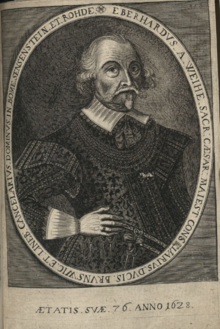Eberhard von Weyhe
Eberhard von Weyhe (born May 28, 1553 in Hanover , † after 1629 (? November 1633 ) in Lüneburg ) was a court official, lawyer and writer.
Life
Weyhe was the son of the councilor and mayor of Hanover Friedrich von Weyhe and his wife Magdalena Anholtz.
Weyhe enrolled at the University of Wittenberg on May 19, 1570 . In May 1572 he moved to the University of Rostock and in 1576 to the University of Marburg . After completing his studies, he and his older brother Peter von Weyhe accompanied Duke Otto Heinrich von Braunschweig-Lüneburg to Italy. Weyhe's return was delayed by studying in France and Switzerland. In 1580 he finished his studies with a doctorate to become Dr. jur. In the same year he accepted a position at the University of Wittenberg , where he held lectures at the chair for pandects in the following semester.
The following year Weyhe married Judith von Behr. In 1583 he was promoted to court judge for the Electoral Saxony; two years later to the Holstein-Gottorfischen council. In 1587 Weyhe was appointed professor for canon law at the University of Wittenberg. In the same year he was also appointed appellate judge and he came into close contact with Nikolaus Krell and other leading representatives of the Christian I of Saxony government . The University of Wittenberg elected Weyhe as its rector in the summer semester of 1589 and in 1591 he was appointed to the Saxon court in Dresden . After the Elector's death, he returned to Wittenberg, but was expelled by the established representatives of Lutheran Orthodoxy because he did not conform to the formula of the Concord and was dismissed from his office because of Calvinist activities .
He found refuge in Kassel in 1594 , where he worked as Chancellor under the aegis of Landgrave Moritz von Hessen-Kassel . In 1605 he was appointed chancellor of Holstein-Schaumburg in Bückeburg and as such he received the office of Landdrosten zu Pinneberg a few years later . Weyhe's career reached its climax in 1614 when he was appointed to the Imperial Council . In 1623 Prince Ludwig I of Anhalt-Köthen accepted him into the Fruit Bringing Society . He gave him the company name of the defensive and the motto of the scorpion poison . The myrtle tree ( Myrtus communis L. ) was given to him as an emblem .
In February 1626, Weyhe resigned from all his offices because he did not want to and could not support the prodan war policy of his prince. Weyhe withdrew to his Gut Böhme and devoted himself only to his literary work. Since his expulsion from Wittenberg, Weyhe had devoted himself increasingly to theology and moral doctrine and wrote works on them in Latin. According to the current state of research, Weyhe published under the pseudonyms Wahremundus ab Ehrenberg , Mirabilis de Bona Casa and Durus de Pascolo .
In 1630 Weyhe was founded by Duke August d. J. von Braunschweig-Wolfenbüttel the honorary title of advice from home . Due to an attack by Duke Georg von Braunschweig-Calenberg's troops in October 1633, Weyhe not only lost his house and farm, but his entire library was lost. He survived this stroke of fate by only a few weeks.
Works
- Aulicus politicus diversis regulis . Myliander, Rostock 1597
- Fricta Juditha et falsa . Poma, Verona 1614
- Meditamenta per foederibus . Kopff, Offenbach 1601 (vol. 1–2)
- Meditatio de vanitate gloriae humanae . Kopff, Frankfurt am Main 1610
literature
- Walter Friedensburg : History of the University of Wittenberg . Max Niemeyer, Halle (Saale) 1917
- Christian Gottlieb Jöcher : Gelehrtenlexikon Vol. 4 Sp. 1922
- Klaus Cornermann: The members of the Fruit Bringing Society 1617–1650 , Leipzig 1985
- Wolfgang Klose: The Wittenberg Scholar's Studbook: the studbook of Abraham Ulrich (1549–1577) and David Ulrich (1580–1623) . Medium Verlag, Halle 1999, ISBN 3-932776-76-3
- Wilhelm Christian Lange: Weyhe, Eberhard von . In: Allgemeine Deutsche Biographie (ADB). Volume 42, Duncker & Humblot, Leipzig 1897, pp. 273-277.
- Weyhe or Weihe, Eberhard von. In: Johann Heinrich Zedler : Large complete universal lexicon of all sciences and arts . Volume 55, Leipzig 1748, column 1191-1194.
Individual evidence
Web links
- Publications by and about Eberhard von Weyhe in VD 17 .
- Works by and about Eberhard von Weyhe in the German Digital Library
- Books at CAMENA
| personal data | |
|---|---|
| SURNAME | Weyhe, Eberhard von |
| BRIEF DESCRIPTION | German court official, lawyer and writer |
| DATE OF BIRTH | May 28, 1553 |
| PLACE OF BIRTH | Hanover |
| DATE OF DEATH | after 1637 |
| Place of death | Luneburg |
